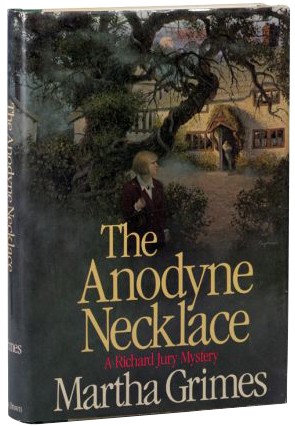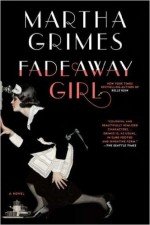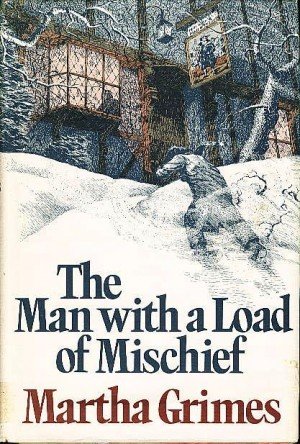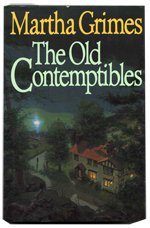
Is it too soon to call Martha Grimes a classic author? At 84 years old she is still going strong, releasing a book a year on average. She is best known for her long-running Richard Jury and Melrose Plant series set in England, but the American author has also penned standalone novels and another series about a 12-year-old girl detective set in the US. She’s won a Nero Award for her Jury series and in 2012 she won a Grand Master Award at the Edgars, run by the Mystery Writers of America. She has sold some 10 million books in the US alone and has been published in 17 countries. She is popular in Germany, where they are currently airing a TV series based on her Richard Jury series.
Not bad for someone who started writing in her 50s, after battling an alcohol addiction together with her grown son. Her name did not appear on a bestseller list until she was 56. She didn’t make serious money from writing until she was 60. Yet Martha Grimes is universally praised for the way she has refreshed – perhaps even re-invented – the traditional British cosy mystery.
Cosy crime fiction
Her Richard Jury books have certainly been described as cosy crime fiction. They are light, relaxing reads but she injects a lot of humour, as well as plenty of blood and guts into her stories. They usually take place in quaint villages and feature a long list of quirky characters, yet the themes can be serious and unsettling. How about parental abandonment, loneliness, obsessive envy and greed, children having to fend for themselves, stunted romantic relationships or animal cruelty? Her strong sense of place, deft comic touches and witty character studies are also highly regarded.
Richard Jury is with New Scotland Yard, but he is often assisted in his enquiries by Melrose Plant, a wealthy aristocrat who has given up his seat in the House of Lords. They have a supporting cast of Dickensian characters to help – or perhaps hinder – them. These include Sergeant Wiggins, Jury’s hypochondriac sidekick who knows all there is to know about the latest health fads. Plant’s fellow villagers in Long Piddleton always feature to some degree in the story, and they are all utterly eccentric and often infuriating: the antiques shop owner, the petty-minded bookshop owner, the rich but generous widow, Melrose’s annoying Aunt Agatha and many more. Jury’s neighbours also deserve a mention like Mrs Wasserman, the Holocaust survivor who acts as a mother figure and is overly nervous of security; and the glamorous Carole-Anne, a woman of indeterminate age who works as a fortune teller in Covent Garden and regularly embarasses Jury.
The two investigators themselves have a good working relationship, although they are a bit like chalk and cheese. Jury is thoughtful, sensitive, intensely private and unlucky in love. He may remind you of PD James‘ Dalgliesh. Plant is a more whimsical and amusing character. He is easygoing, intelligent, more sociable and not as pensive as Jury. Perhaps there are shades of Dorothy L Sayers‘ Lord Peter Wimsey in him.
When asked why she sets most of her novels in England, although she has never lived there, Grimes explained that these are the kind of books she enjoys reading: “It didn’t occur to me that maybe I shouldn’t, that is: What do you know about Britain? When I go to England – and I do this once, sometimes twice a year – I never stay very long. I don’t take notes. I get so intrigued by names. Names of villages. Names of streets. Just names that for some reason really turn me on. The only research I do is the accidental coming upon of a pub, the name of which I think is just fantastic. And then I go in – and that’s the research.”
This is all the more poignant, when we realise that the author is a recovering alcoholic and therefore does not actually drink in the pubs that inspire her.
Similar authors
The obvious comparison would be to her fellow countrywoman who also sets her mysteries firmly in Britain, Elizabeth George. Yet there is humour and close observational skills comparable to those of Louise Penny in her work, and the erudite side notes like PD James. Plus, she can write equally well about small-town America with its petty, cruel and eccentric characters and secrets, as she proves in the Emma Graham series.
For those coming new to the series and reading them out of order, they can seem confusing and a bit of an acquired taste. Like Penny, Grimes seems to be drifting away from mysteries and moving closer to character studies in her more recent books, and she dissects the shortcomings not just of individuals but of a whole community. Detection is conducted through lots of conversations – in pubs or tea shops – and this can feel repetitive at times, as hypotheses are set up, discussed and discarded. The scientifically minded will say that the books are not clearly anchored in time: the characters never seem to age, they don’t seem to have access to the latest gadgets and yet do not fit into any decade of the 20th century either. But it is precisely this timeless quality and the focus on relationships which will charm and entertain certain readers and keep them coming back for more.
For an introduction to Martha Grimes, I would recommend starting at the beginning of the Richard Jury series, with The Man with a Load of Mischief, which introduces most of the recurring characters. Out of the many other books in the series, my personal favourites are I Am the Only Running Footman, The Anodyne Necklace and The Old Contemptibles, although the unusual The Old Wine Shades may appeal to those who normally don’t read mysteries. Also worth a look are Hotel Paradise, the first to feature the irrepressible pre-teen Emma Graham, and the very funny satire of the New York publishing world Foul Matter.
For more cosy crime fiction click here, and to see the rest of our Classics in September articles this year, click here. Let us know about your favourite Martha Grimes novel below.


















great job on a great writer.